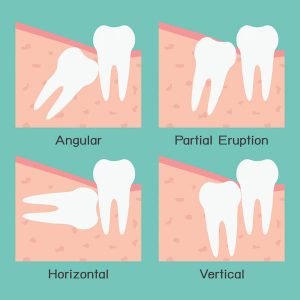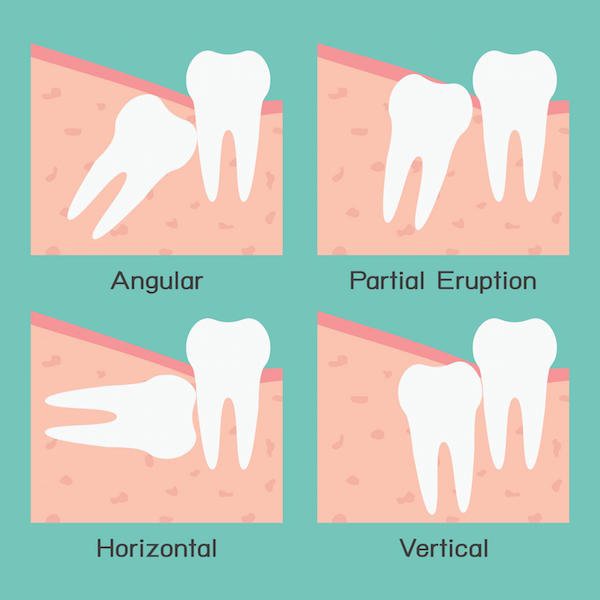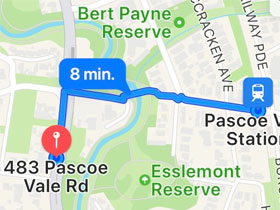 Wisdom teeth extractions are among the most common surgeries performed by dentists.
Wisdom teeth extractions are among the most common surgeries performed by dentists.
Wisdom teeth have a tendency to come in later in life, when the jaw is already full, and they often come in at unnatural angles, becoming stuck and unable to break through the gums. When this happens, it is known as an impacted wisdom tooth.
At The Glenroy Dental Group we assure you that impacted wisdom teeth can usually be quickly, safely, and painlessly removed, particularly if you get to our office before serious problems develop.
What are wisdom teeth and why might they need extraction?
Wisdom teeth are the 3rd and last set of molars to come into the jaw. Wisdom teeth are located on each side of the upper and lower jaws. Most people get them in their late teens or early 20s, which is why they are associated with ‘wisdom’.
Because wisdom teeth come through the gums so late in life, they often enter a crowded jaw. This can harm nearby teeth, the jawbone, and even the nerves and tissues in the area. In some cases they fail to fully erupt through the gums.
This can lead to pain, infection, and damage. Even when wisdom teeth come in cleanly, their location at the rear of the mouth makes them difficult to keep clean.
For these reasons, and more, extraction is sometimes needed.
The extraction process
Anaesthesia
Before your wisdom teeth are extracted, you’ll receive an injection of local anaesthetic to numb the tooth and surrounding area.
If you suffer from dental anxiety or phobia, your dentist may give you a sedative to allow you to relax. This is usually in the form of an injection.
In some cases, general anaesthesia is caller for in wisdom tooth removal. In this case you should still be able to return home on the same day, but you will need to arrange for someone else to drive you.
Removing the tooth
If the tooth hasn’t erupted through the gum, an incision is made in the gum to reach it. In some cases a small piece of bone covering the tooth may also need to be removed.
The tooth may be broken into smaller parts to make it easier to extract through the incision. If the tooth has already come through the gum, the likelihood of an incision is decreased.
Patients often feel a sensation of pressure just as the tooth is removed, as your dentist may wiggle the tooth back and forth to make extraction easier.
The anaesthetic should ensure that there is no pain during the procedure. If you do feel pain during the extraction, just tell your dentist or oral surgeon about it and they will give you more anaesthetic.
The length of the extraction procedure depends on the individual case. Simple extractions can take a few minutes, but they can take up to 45 minutes if the case is more complicated.
After surgery
Once the tooth has been removed, if an incision was required, self-dissolving stitches are used to seal the gum. These stitches will dissolve in your mouth, sometime between three and ten days.
Your dentist may place gauze on the site of the extraction and ask you to maintain a light pressure on it. This allows blood formation in the empty tooth socket. Patients are asked to check the gauze regularly and replace it when it becomes saturated, about every 60 to 90 minutes. The gauze may remain while drinking, but should be taken out before eating.
Occasionally, antibiotics are prescribed to reduce an ongoing infection or reduce the risk of one.
The following day you can resume tooth-brushing at night and gently rinse your mouth taking care not to damage any clotting. Avoid dental cleaning products such as toothpaste. The day after surgery, rinse your mouth five to six times a day with lukewarm water that contains a teaspoon of salt.
Your diet will be restricted to soft foods during the first few days after surgery. Do not use straws, as sucking can dislodge blood clots.
If you experience symptoms on the third to fifth day after surgery, contact our practice.
If your questions or concerns related to wisdom tooth extraction aftercare have not been answered here, call or visit The Glenroy Dental Group for more information!
The Glenroy Dental Group and You
At The Glenroy Dental Group, your health and happiness, and that of your children and family, are our dental goals. We use the most modern technology available and employ the latest dental techniques to ensure that your dental health and appearance are at the highest level. We want you to receive the best possible dental care with no pain or anxiety!
Our offices are conveniently located in the Pascoe Vale Road shopping strip, Glenroy, with ample parking space, we are located within easy walking distance of the Glenroy train station.
Same Day Dental Emergency Appointment Available
Call us on (03) 9306 6511 or visit us at: 2/830 Pascoe Vale Rd in Glenroy.







